Seattle's Main Street: stories of pandemic hardship and reinvention
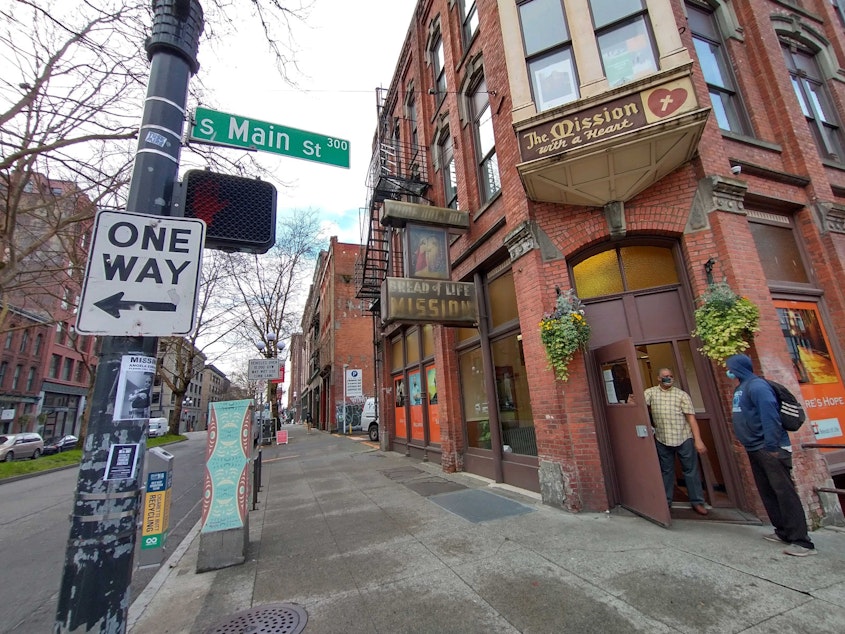
This has been a really hard year.
But the pandemic is shifting and we’re poised to recover. At this moment, we’re just trying to figure out, how people are doing? And what does their future look like?
KUOW is launching a series called The Main Street Project, where we get a sense of what life is like on a single street. Our series begins in Seattle.
The intersection of First Avenue and Main Street in Pioneer Square feels pretty quiet these days. There's some traffic. Real Change vendors pass back and forth, picking up their newspapers.
However, a lot of the storefronts on this street have their lights out and their doors locked. They look sleepy.
But we know there were things going on inside because we'd been knocking on those doors.
We walked up and down Main Street and interviewed people about how they're doing and what they've been up to. We started at an old building adorned with a neon sign that has an image of Jesus on it. It’s a homeless shelter.
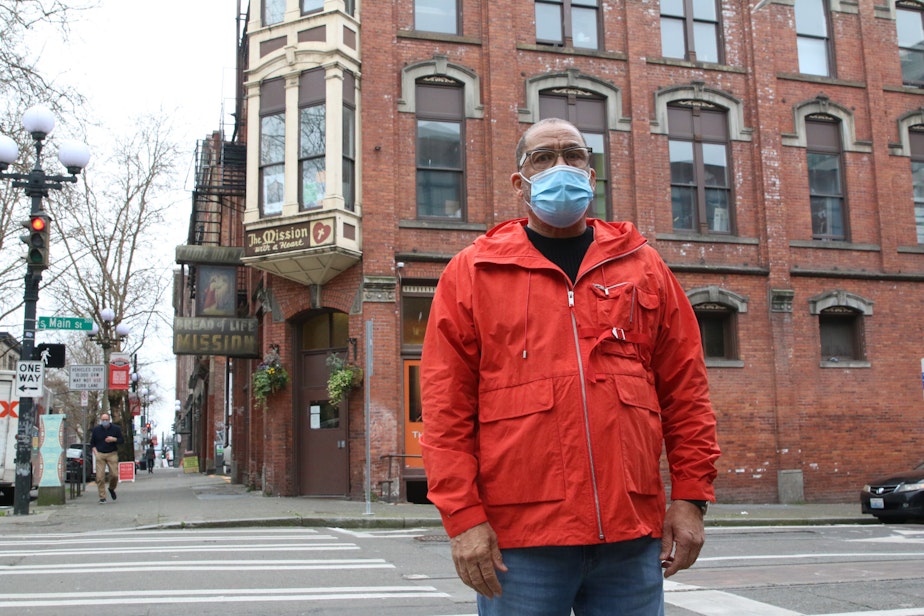
Sponsored
We met Willie Parish Jr., president of the Bread of Life Mission.
Parish told me the facility usually sleeps 140 people per night. But due to the pandemic, that occupancy is down to roughly 50 people per night. They have to maintain social distance and people are afraid of catching the virus in shelters.
“Well, there's a lot of fear," Parish said. "Fear that they will be tested positive ... there are some people that won’t even take a test. But we require that in our building. If you want to stay in our building, you must take a test.”
But despite the fact that they're serving fewer people, donations to the mission have been way up.
“God has been so good to us ... we’ve had people, donors, individuals, churches, foundations that have stepped up and given to us, over and beyond. So we have no complaint along those lines.”
Sponsored
The money helped the mission pay for some upgrades, like a new floor and a fresh coat of paint inside.
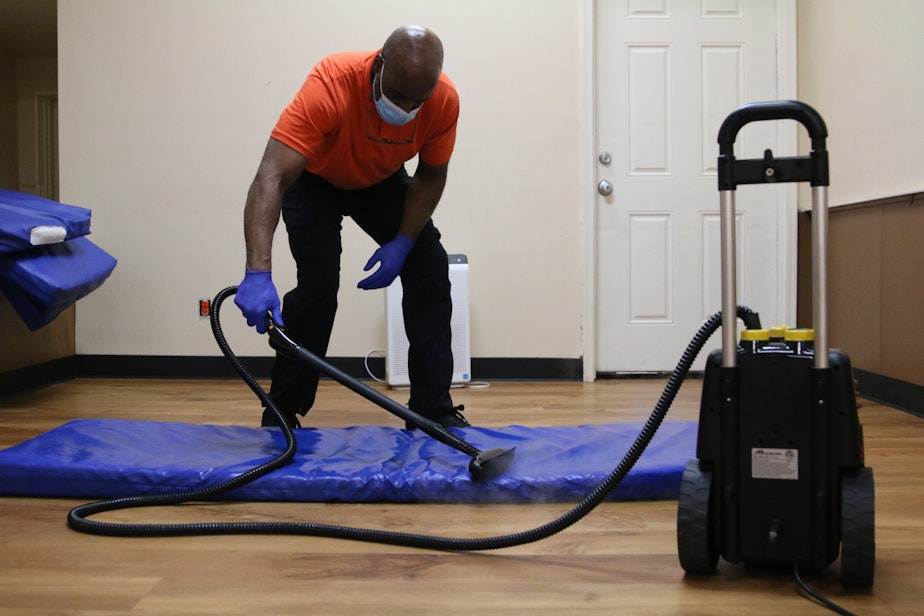
The money also paid for a new steam cleaner used to clean mattresses. Bread of Life resident Tony Zachary showed me how it works.
“If a guy feels like his mat is not clean enough – we could do it again!” Zachary said.
They can keep the place clean for now. But they'll have their work cut out for them once the pandemic’s over, convincing people that shelters are safe.
Sponsored
Zachary thinks they can do it. He said the pandemic has changed this place forever.
“It made the mission better. When you talking about Covid, and when you’re talking about sanitation, this mission is much better,” he said.
We heard a lot of stories about change as we walked the street. Across the street from the mission is a theater, Café Nordo. Terry Podgorski is one of the artistic directors.
He came out of the basement door with his hands full of boxes.
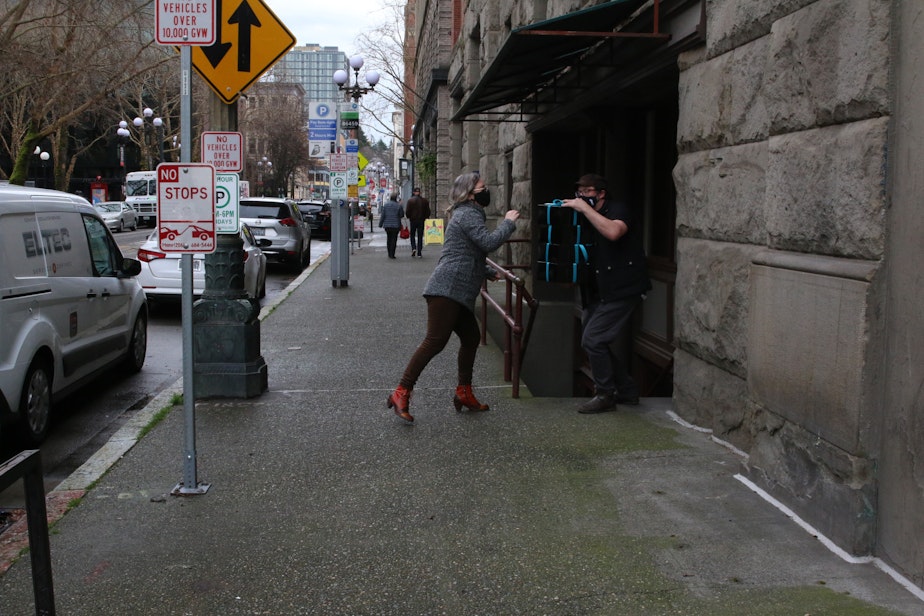
Sponsored
Before the pandemic, Café Nordo did immersive dinner theater, with elaborate sets. For a while, after things closed, employees wondered, "What do we do?"
But then they figured out a way to pack dinner theater into a box — and ship it nationwide. They put in food, cocktail ingredients, and little knick knacks connected to the play.

“We are hoping that this becomes another leg of our business," Podgorski said. "It’s something that we’ve talked about for a long time."
But they never had time to do it.
Sponsored
Now, Podgorski said these boxes could become huge for them — long after the pandemic.
“Maybe there’ll be a time when a theater show is happening, and a box of the same story is going out, and they tell different elements of the stories. And they complement each other," he said.
Or, they could reach a whole new audience in other parts of the country.
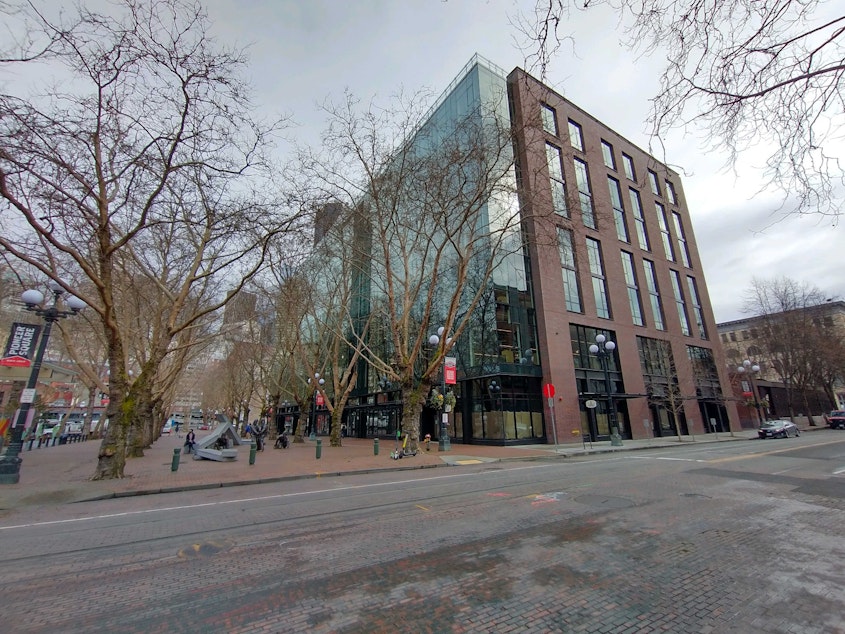
Continuing down Main Street, there's the Weyerhaeuser Headquarters building on Occidental Park.
There used to be 700 workers there, many of whom would buy lunch at the surrounding restaurants and visit the stores. But they’re almost all gone now.
Just down the street, is Main Street Gyros. It’s in a tiny adobe house in a triangular sliver of asphalt. Hamza Albadan owns this place. He’s had a really hard year.
“I feel angry, I feel upset," Albadan said. "Because, you know, I came from overseas to make my life here. What's the point if I’ve been working so hard to make this business?"
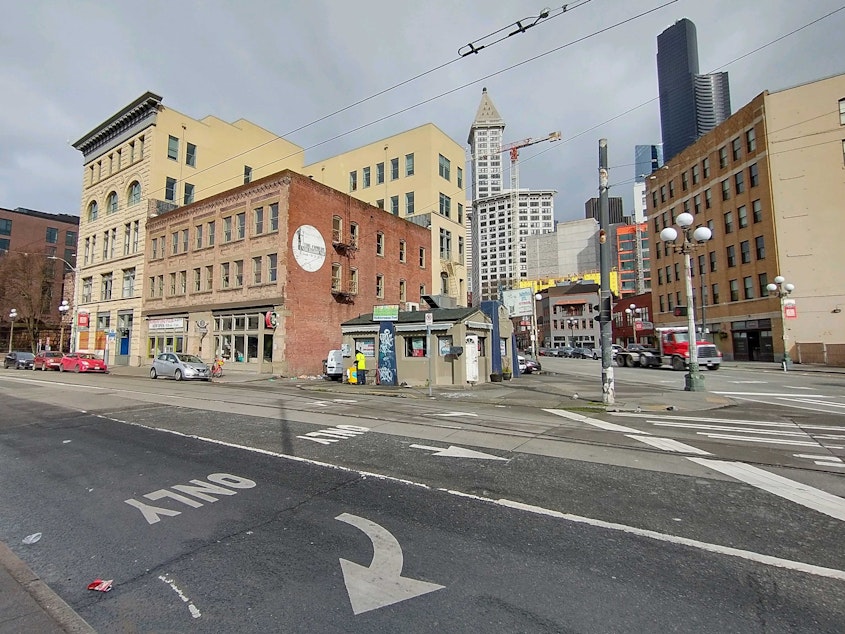
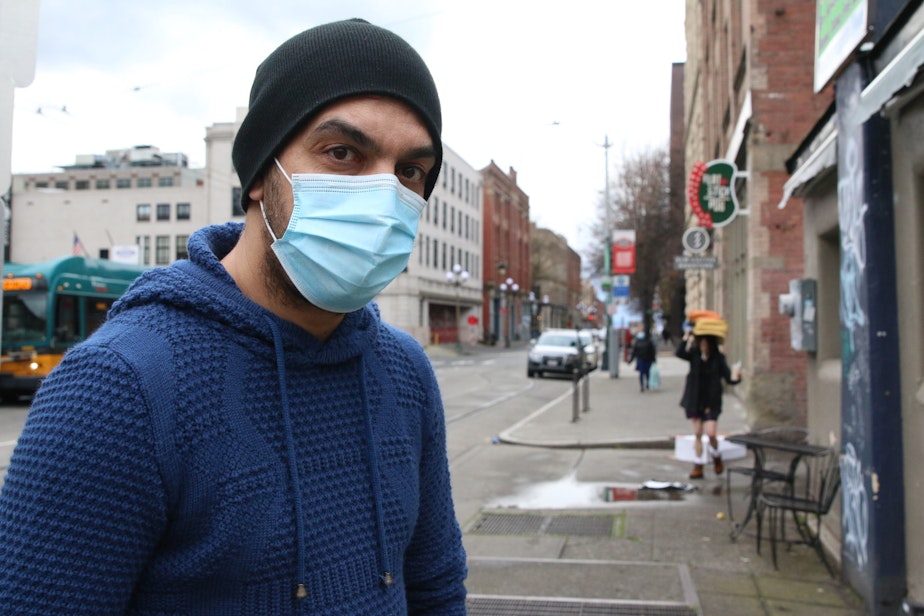
He said his year was really hard because until recently, there was a large tent encampment right outside his door. He said customers stopped coming in and Doordash drivers wouldn’t stop to pick up food.
Several weeks ago, the city cleared the encampment, and Albadan said customers started to return.
But encampment clearing isn't a long-term solution — it only moves unhoused people on to other locations where they face the same predicaments.
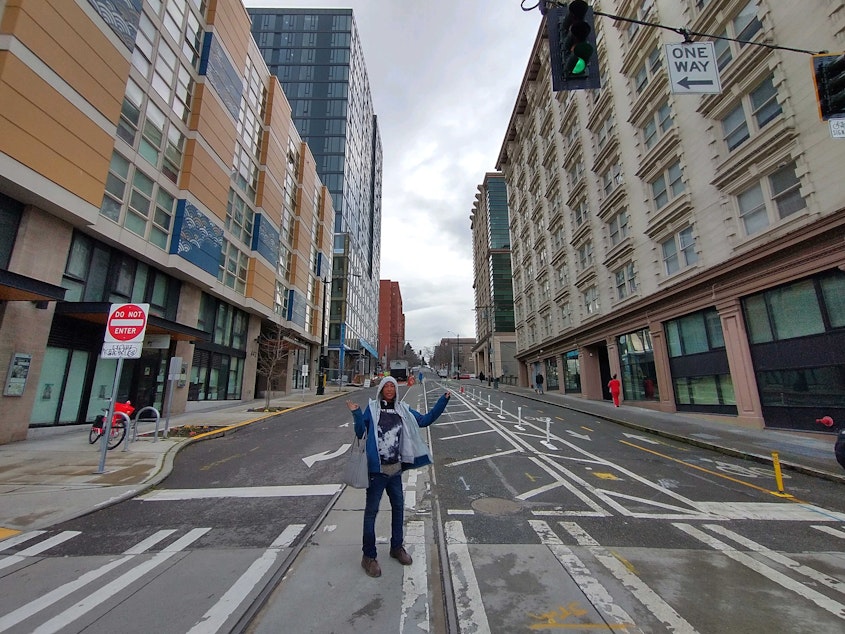
We later headed down Main Street into the Chinatown International District.
There’s a new condo tower under construction there, the KODA Condominiums.
Little groups of people were touring it, wearing hardhats and carrying unit plans.
After their tours, they came outside, stood on the sidewalk, and looked down Main Street, toward Occidental Park.
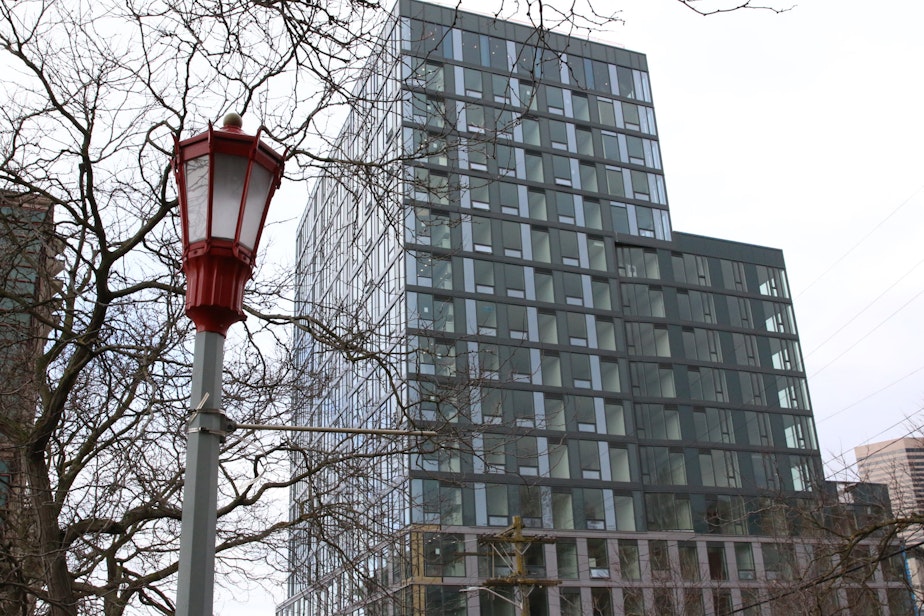
Kevin Hsieh is with the development company.
“We’ve been here over three, four years, now ... just doing the construction," Hsieh said. And we feel it. We feel all the opportunity and potential with this neighborhood.
"Obviously, Covid has stalled the growth of it. But we really do believe strongly that after the Covid and when ... life comes back to normal, this street’s only gonna get better.”
Later this year, this new tower could be spitting out a hundreds of new pedestrians onto those sidewalks. They’ll become part of the neighborhood’s recovery.
We started at one end of Main Street at the Bread of Life Mission. We ended at another establishment that’s even older: a tiny Japanese restaurant called Maneki.
Maneki survived the Spanish Flu of 1918. And owner Jean Nakayama said it’ll survive this pandemic too. But it hasn’t been easy — they boarded up the windows last year.
Now, they’re reluctant to take them down because of recent attacks on Asian Americans.
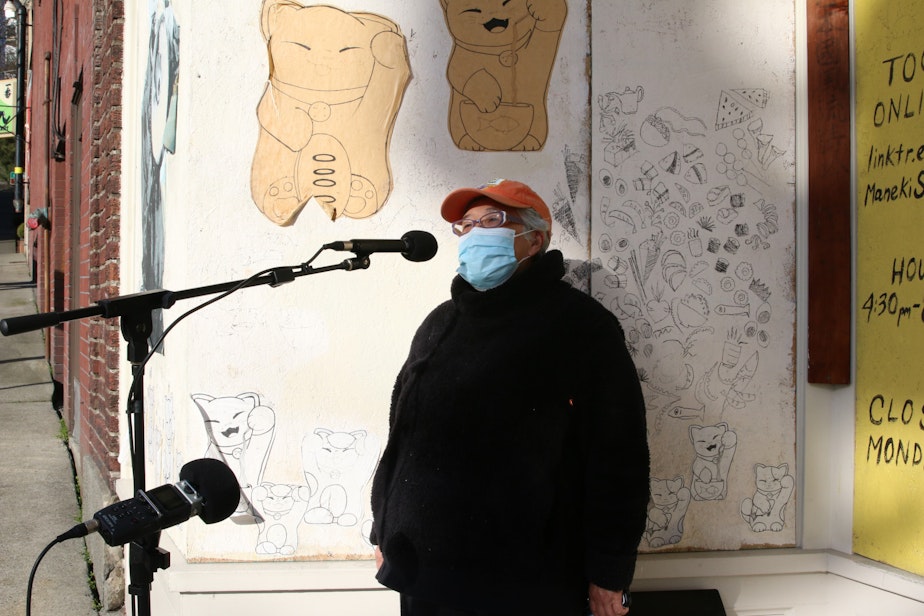
“I mean right now, it feels like a prison inside, because there’s no sunlight," Nakayama said. "I can’t even tell if the windows are dirty or not.”
But Maneki’s customers have rallied behind it, nominating the restaurant in a contest. Maneki won, and Puget Sound Energy is paying for a big remodel. They’re even putting in a fancy new HVAC system that supposedly can help curb the spread of viruses.
Nakayama and her mom can’t wait to get back to serving customers.
“Mom’s at home, she’s 91. She got her vaccine and she’s bored stiff," Nakayama said. "And she can’t wait to get back to Maneki and tend the bar."
All up and down Seattle’s Main Street, things look kind of sleepy. But behind closed doors, these places are going through some big changes. That's because the people who run these establishments want them to survive.
The hope is that when the pandemic is all over, we can be together and sit down for a good meal, like friends who’ve been apart for a long time.
RELATED: Rescuing Seattle's economy will take some creativity. This woman traveled thousands of miles to help




